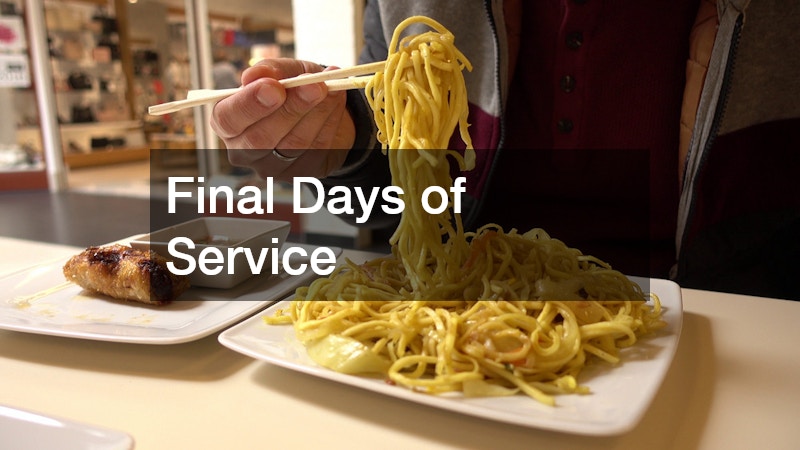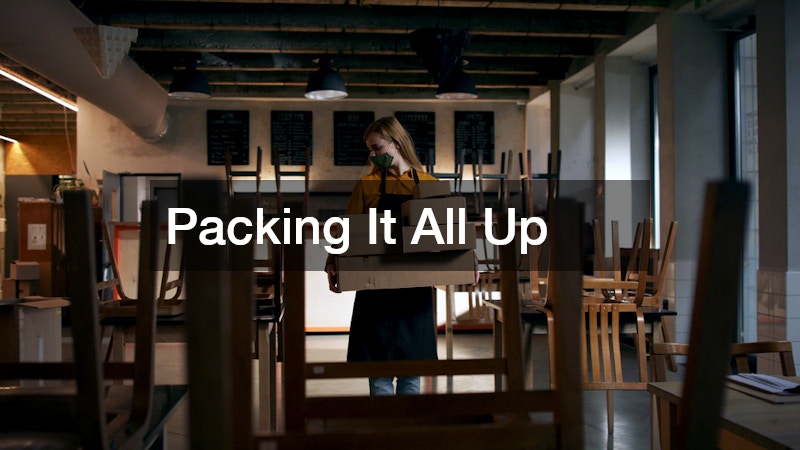Deciding to close a restaurant is never easy, especially when it involves years of hard work, deep community ties, and loyal customers. For many independent eateries, the road to success is a challenging one, and when circumstances change, whether due to economic shifts, personal reasons, or declining sales, the decision to shutter the doors can become a reality. If you find yourself preparing to be closed for good, it’s important to approach the process with careful planning, professionalism, and a respectful farewell to what you’ve built.
This guide walks through ten major considerations to keep in mind when preparing to close your restaurant. From assessing your final days of service to valuing what remains of your assets and handling complex legal matters, each step presents an opportunity to bring closure in a thoughtful and responsible way. The process doesn’t end when the sign comes down. Waste management, cleaning, inventory removal, and even post-closure transitions all deserve attention.
As you work through the logistics, you’ll find that there’s more to shuttering a business than simply turning off the lights. Consider how you’ll notify staff and customers, what obligations still exist in your lease, and how you’ll dispose of or sell off property and supplies. The decisions you make now can protect your finances, your reputation, and your future.
Each section in this article is designed to help you navigate one component of the closing process. Whether you’re looking for insight on selling, legal help, or just how to clear out your remaining equipment, we’ll break it down clearly. If your restaurant is going to close permanently, take time to finish well. With the right approach, you can end this chapter with dignity and set yourself up for what comes next.
1. Final Days of Service

Closing the doors on a beloved dining spot is a deeply emotional milestone, particularly for establishments that have long served flavorful dishes and become a staple in their community. The final days of operation offer a chance to say goodbye to your regulars and staff, and also to acknowledge the cultural and culinary contributions of your restaurant. This closing period should be handled with care, providing a meaningful end to your journey.
For those operating Chinese food restaurants, these final days may hold special cultural significance, given the longstanding traditions and family recipes often passed down through generations. Consider creating a limited farewell menu or offering discounts to long-time customers. It’s also a great opportunity to share your story on social media or in local publications. You will want to thank your community for their support over the years.
As your business prepares to be closed for good, your restaurant’s identity deserves a thoughtful conclusion. Hosting a final celebration or inviting patrons to leave notes of appreciation can be a beautiful way to honor what you’ve built. This helps create closure not only for you and your team but also for the community that made your establishment part of their routines.
2. Valuing Your Assets
Determining the value of what remains when you close your business is one of the most critical and financially impactful tasks you’ll face. From property and equipment to brand recognition and goodwill, various aspects can still be monetized. Evaluating these assets with an eye toward accuracy and transparency can help you recover value from your investment.
If you plan to sell a business, even in its final days, it’s essential to document your assets and understand their fair market value. This includes not only physical property like tables and cooking equipment but also your customer database, domain name, or existing lease agreement. These details can make your offering more attractive to a potential buyer looking for a turn-key opportunity or a fresh start.
Before your business is closed for good, consult a professional or use a business valuation service to ensure you’re setting realistic expectations. Even if the business doesn’t sell in full, understanding the value of individual parts may guide decisions about auctions, consignment, or private sales. This step is more than a financial formality. It’s a way to honor what you’ve built and recoup some of your effort.
3. Finding a Buyer

Selling or transferring ownership of a business requires careful legal consideration, especially when contracts, licenses, and liabilities are involved. Ensure you have the right documents in place. Also, ensure parties understand their responsibilities. That may prevent complications during and after the transition. Legal guidance here is essential.
Engaging with experienced attorneys can help you manage the paperwork, negotiate terms, and review offers from interested parties. Whether you’re transferring a lease, selling the business outright, or negotiating a partial asset sale, their insight will help you avoid mistakes that could affect your personal finances or legal standing.
When your restaurant is closed for good, it’s not just about ending a venture; it’s about doing it right. Attorneys can also help you handle employment termination, address any claims, and ensure compliance with local and state regulations. Their role isn’t just reactive; they help you close the chapter without loose ends that could come back to haunt you later.
4. Legal Steps to Take
Financial hardship is often a significant reason a business owner decides to close their doors. When debts outweigh assets, filing for legal protection may be necessary to exit responsibly. The process can be complicated, and choosing the right path forward requires an understanding of your financial situation and legal options.
Bankruptcy services offer structured solutions, including formal reorganization or liquidation options. If you’re struggling to meet obligations like rent, payroll, or vendor invoices, exploring these services can provide relief. They can also prevent long-term financial fallout. Different types of filings suit different scenarios, and knowing which one applies to your case is vital.
Before going closed for good, weigh all your financial liabilities and speak with professionals who can help you determine if bankruptcy is the most strategic route. It may feel like a last resort, but in many cases, it’s a way to responsibly discharge debts and protect your personal assets from future claims.
5. Managing the Waste

When a restaurant shuts down, waste management becomes a necessary but often overlooked part of the process. From expired inventory and broken furniture to packaging and disposable supplies, the sheer volume of what needs to be discarded can be surprising. Handling this aspect properly is important not only for cleanliness but also for compliance with local disposal regulations.
Renting a dumpster is often the most efficient solution for managing the waste generated when clearing out a food business. It allows for fast, organized disposal of everything that can’t be sold, donated, or recycled. You can choose a size based on the scale of your cleanup and schedule a pickup once everything is cleared. This streamlines the process and saves trips to the dump.
As you prepare to be closed for good, a dumpster rental signals that you’re serious about leaving the premises in good condition. It’s also a responsible step for the environment and your landlord. Make sure to separate items that need special handling, such as grease, electronics, or cleaning chemicals. Consider offering still-usable goods to shelters or community kitchens before tossing them out.
6. Handling the Gear
Commercial kitchens rely on specialized equipment, much of which holds residual value long after the last meal is served. Stoves, fryers, refrigerators, prep stations, and more can often be sold, refurbished, or repurposed, depending on their condition. Taking stock of your major items can provide one of the most immediate sources of return.
Start by cataloging your appliances and checking resale marketplaces or local dealers who buy secondhand commercial gear. Clean everything thoroughly and take high-quality photos. If you’re pressed for time, consider a bulk sale. Work with a liquidator to expedite the process. Don’t forget to factor in professional removal or disconnection if needed.
Being closed for good means facing the physical breakdown of your business, removing what once powered your success. Your appliances represent both investment and opportunity. How you manage them can reduce final costs, recover funds, and support someone else starting their food venture.
7. Packing It All Up

Packing up a restaurant is a large-scale task that involves more than just boxing up plates. From dining room furniture to kitchen tools and office supplies, moving out can be physically demanding and emotionally draining. Attempting to do it solo can lead to delays, damage, or even injury.
Hiring a professional moving service can ease the burden and ensure that your belongings are packed, transported, or stored with care. Movers experienced in commercial settings understand how to disassemble large furniture and secure fragile equipment. They can also assist with logistics if items are being sent to multiple destinations or storage units.
As you go closed for good, streamlining the physical exit allows you to focus on higher-level decisions. Letting professionals handle the move ensures the process is swift, organized, and respectful of the time and energy you’ve already invested in winding down.
8. Securing the Space
Once your business is no longer operating, security becomes a primary concern. An empty restaurant can be a target for theft, vandalism, or unauthorized access. It’s your responsibility to leave the space secure for the next tenant or until the lease is resolved.
Access and security controls, such as reprogramming entry codes, changing locks, and disabling POS systems, should be part of your closing checklist. If you’ve used security cameras, make sure they’re cleared or transferred properly. Inform any security vendors of your closure and cancel monitoring services as needed.
Being closed for good doesn’t mean walking away without safeguards. Taking these steps protects your remaining assets, respects your lease terms, and ensures that you’re not held liable for what happens after you’re gone. A well-secured exit reflects professionalism, even in a difficult time.
9. Cleaning the Premises
Before handing over the keys, thorough cleaning is a must. Whether you’re leaving a leased space or selling the building, a deep clean helps fulfill lease agreements, boosts property appeal, and leaves a positive final impression. Dust, grime, and kitchen residue accumulate over time and need attention.
Hiring an office cleaning service that also handles commercial kitchens is a smart move. These professionals are equipped to deal with grease traps, ventilation systems, and food prep surfaces. They can also tackle floors, walls, and restrooms, ensuring the space is inspection-ready.
Even when your business is closed for good, taking time to clean up shows integrity. It may seem like a small detail, but it helps preserve your reputation and can even lead to good word-of-mouth or references. A well-maintained exit is part of closing with dignity.
10. What Comes After?
The period after closing a restaurant can be a strange mix of grief, relief, and possibility. It’s natural to reflect on what was, but it’s also important to think about what could be next. Whether you plan to stay in the food industry or explore something new, closure offers a fresh slate.
Some former restaurant owners transition into roles at entertainment centers, food halls, or event venues where their skills can shine in new ways. Others use this time to consult, teach, or even launch a completely different business. Exploring new environments can reignite your passion and make use of your expertise in fresh ways.
Going closed for good may feel like an ending, but it can also be a pivot. It doesn’t matter whether you find your next calling in hospitality, events, or another industry altogether. The experience you’ve gained will continue to serve you. Honor what you’ve built, and give yourself space to dream about what’s next.
Saying Goodbye
Closing your restaurant may be one of the most emotionally complex and logistically demanding experiences you’ll face as a business owner. But with thoughtful preparation and support, it can also be a process that allows you to move forward with clarity, integrity, and a sense of completion. This article has walked you through the key areas to address when you’re going out of business, from the last day of service to selling off assets.
Each of the ten considerations we’ve covered serves as a guidepost to help you finish well. Saying goodbye to your community with intention helps preserve your legacy. Properly evaluating and selling your equipment and supplies protects your investment. Bringing in the right professionals reduces stress and ensures you’re meeting obligations with confidence and care.
Security, waste management, and final cleanups may not be glamorous. However, they are critical for closing your business the right way. Even after the doors are locked and the tables are gone, your next chapter awaits. Whether you stay in the culinary world or pivot to something new, the experience of running a restaurant will have prepared you for just about anything.
Being closed for good doesn’t mean failure. It can mean readiness for rest, reinvention, or revival. With care and diligence, you can end this chapter on your terms. Every choice you’ve made was part of a larger story worth telling.





